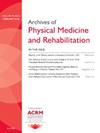Cognitive-communicative Abilities and Social Engagement: Self-reported Changes in Adults With Cancer-related Cognitive Impairment 8251
IF 3.6
2区 医学
Q1 REHABILITATION
Archives of physical medicine and rehabilitation
Pub Date : 2025-04-01
DOI:10.1016/j.apmr.2025.01.043
引用次数: 0
Abstract
Objectives
To investigate the prevalence of cognitive communication deficits among adult cancer survivors with self-reported CRCI. To determine the impact of CRCI on social engagement and satisfaction with social roles and activities.
Design
This study used a cross-sectional design to collect data through an online survey distributed to cancer survivors.
Setting
The survey was disseminated online, reaching a diverse population of cancer survivors across various geographic locations.
Participants
Eligible participants were adult cancer survivors without primary or metastatic brain tumors or progressive neurological diseases. A total of 135 participants met the inclusion criteria for this study, with a majority of them being women (91.77%).
Interventions
Participants completed an online survey consisting of sections covering demographic information, self-perceived cognitive communication abilities, social participation, and satisfaction with social roles.
Main Outcome Measures
The main outcome measures included self-reported cognitive communication deficits (measured by the Cognitive Communication Checklist for Acquired Brain Injury), social participation (measured by Neuro-QOLv1.0), and satisfaction with social roles (measured by Neuro-QOLv1.1).
Results
Most participants (82.58%) reported experiencing CRCI, with self-perceived impairment across various cognitive communication domains. The most pronounced difficulties were observed in functional daily communication. Participants reported more difficulty in participating in social roles and activities compared with satisfaction with social participation. No significant differences in cognitive communication scores were found based on cancer type or stage at diagnosis. However, age significantly affected cognitive communication scores, with younger survivors experiencing distinct challenges.
Conclusions
The study highlights the multidimensional nature of CRCI and its impact on social well-being among cancer survivors. Findings suggest the importance of personalized interventions addressing cognitive communication deficits to enhance quality of life and overall well-being. Speech-language pathologists could play a crucial role in identifying and addressing these deficits. Future research should explore caregiver perspectives on CRCI, employ longitudinal designs, and investigate the effectiveness of specific interventions and supportive care services to improve outcomes for cancer survivors.
Disclosures
Patricia Geels is employed as an assistant professor in the Vera Z. Dwyer College of Health Sciences at Indiana University South Bend.
认知交际能力和社会参与:癌症相关认知障碍成人自我报告的变化[j]
目标调查自称患有 CRCI 的成年癌症幸存者中认知交流障碍的发生率。确定 CRCI 对社会参与的影响以及对社会角色和活动的满意度。本研究采用横断面设计,通过向癌症幸存者发放在线调查问卷来收集数据。共有 135 名参与者符合本研究的纳入标准,其中大部分为女性(91.77%)。干预措施参与者完成一份在线调查,调查内容包括人口统计学信息、自我认知沟通能力、社会参与和社会角色满意度。主要结果测量主要结果测量包括自我报告的认知交流障碍(通过获得性脑损伤认知交流检查表测量)、社会参与(通过神经-QOLv1.0测量)和社会角色满意度(通过神经-QOLv1.1测量)。日常功能性交流方面的困难最为明显。与对社会参与的满意度相比,参与者在参与社会角色和社会活动方面遇到的困难更大。根据癌症类型或诊断阶段的不同,认知交流得分也没有明显差异。该研究强调了 CRCI 的多维性及其对癌症幸存者社会福祉的影响。研究结果表明,针对认知交流障碍采取个性化干预措施对于提高生活质量和整体幸福感非常重要。言语病理学家可以在识别和解决这些缺陷方面发挥关键作用。未来的研究应探讨照顾者对 CRCI 的看法,采用纵向设计,并调查特定干预措施和支持性护理服务的有效性,以改善癌症幸存者的预后。
本文章由计算机程序翻译,如有差异,请以英文原文为准。
求助全文
约1分钟内获得全文
求助全文
来源期刊
CiteScore
6.20
自引率
4.70%
发文量
495
审稿时长
38 days
期刊介绍:
The Archives of Physical Medicine and Rehabilitation publishes original, peer-reviewed research and clinical reports on important trends and developments in physical medicine and rehabilitation and related fields. This international journal brings researchers and clinicians authoritative information on the therapeutic utilization of physical, behavioral and pharmaceutical agents in providing comprehensive care for individuals with chronic illness and disabilities.
Archives began publication in 1920, publishes monthly, and is the official journal of the American Congress of Rehabilitation Medicine. Its papers are cited more often than any other rehabilitation journal.

 求助内容:
求助内容: 应助结果提醒方式:
应助结果提醒方式:


